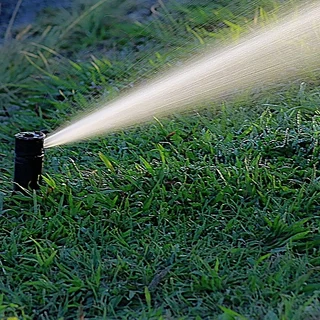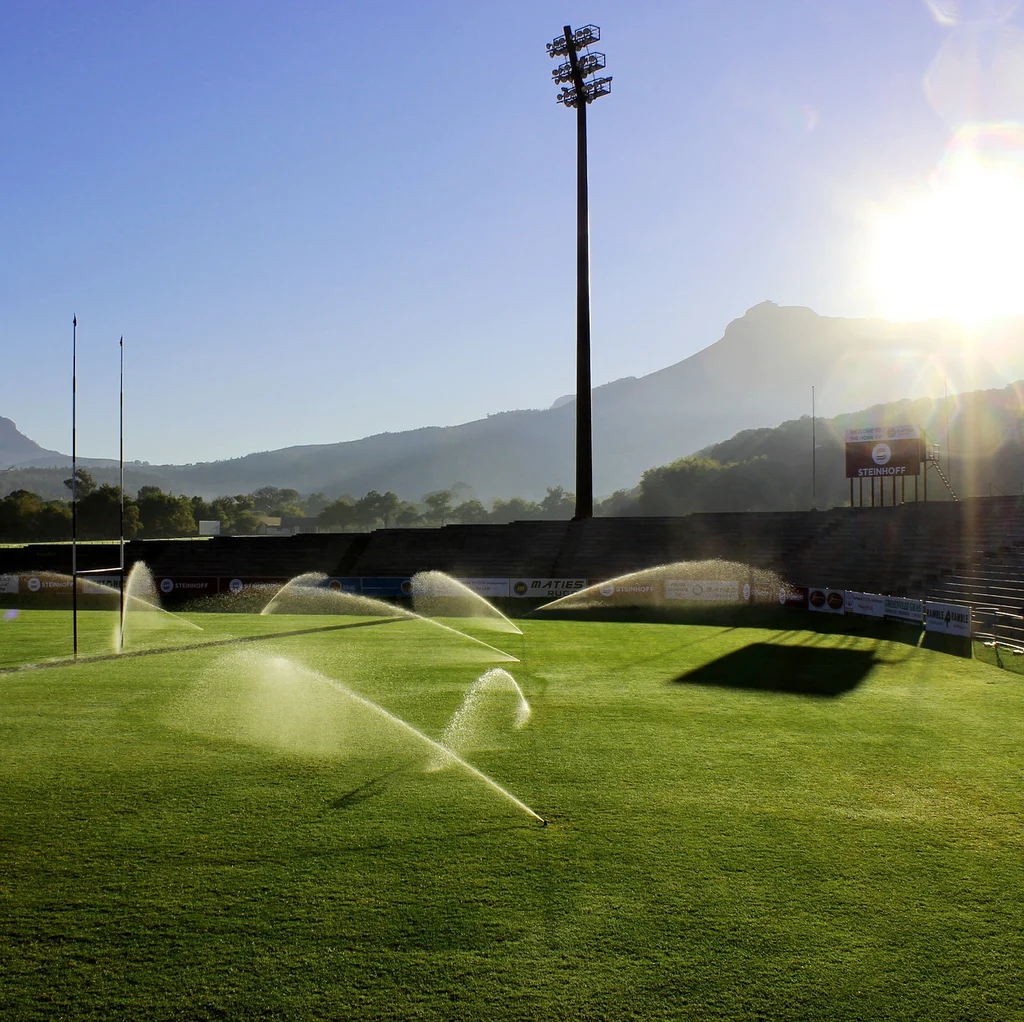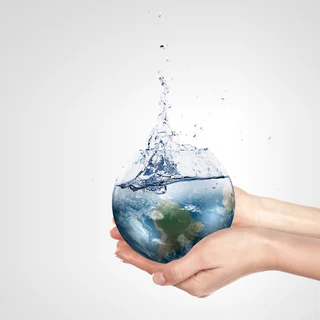Is your landscaping lively, lush, healthy and vibrant?
Or brown, lackluster, struggling to survive?
Water makes all the difference.
One of the best ways to protect your investment in your property’s landscaping is to install an irrigation system.
How much will it cost? The cost of irrigation service depends on several different factors.
Let’s take a look.
First, A Look At The Benefits
You can’t discuss the cost of irrigation without talking about the benefits. Your investment definitely pays off.
No More Wasted Water
An irrigation system is the most efficient way to water your property.

Hoses and sprinklers use more water than necessary and don’t evenly distribute the water. Water often sprays where it isn’t needed, shooting over onto pavement, driveways and sidewalks.
It’s easy to forget to turn the sprinkler off, so you’re often using more water than your landscape needs.
An irrigation system prevents this waste. The sprinkler heads are placed at precise locations that allow them to deliver water only where it’s needed —to lawn, shrubs, trees and flower beds. And timers ensure automatic turnoff, whether you’re paying attention or not.
That saves water — and money.
You Have Better Things To Do
Irrigation systems work on their own, so no more wasting time manually watering. We all know you have better things to do than ducking outside to move and adjust sprinklers and hoses. You take care of business, while your irrigation system takes care of your property’s health.
Street Appeal
Your commercial property’s landscaping is the public’s first impression of your business. Healthy, vibrant grass, flowers, trees and shrubs shows the community you care about your business — inside and out.
If you’re a homeowner, this applies to you, too — beautiful, healthy landscaping lends curb appeal and value to your home.
All this landscaping loveliness requires the right amount of water. An irrigation system lets you schedule watering intervals and set timers to ensure proper and strategic watering. So you get thorough, even and correct irrigation throughout your property.
Sometimes sections of your property need extra water — a new patch of sod or a newly planted tree. Automated sprinkler systems can be adjusted to water those areas longer.
And if you’re away from your property for any length of time, the watering can go on without you, keeping your street appeal intact.
Next, What Factors Affect The Cost?
Every property is different, which means each site comes with its own irrigation price tag. But here’s a look at some of the factors that affect the cost:
The Size Of Your Property
Square footage is the biggest factor that determines the cost of an irrigation system. No rocket science here: the larger the property, the higher the price.
A larger property will require more piping and additional sprinkler heads, which means more money.
Your landscaping company will measure your site to calculate exactly how much material will be needed for the install.
Because sprinkler systems are installed in zones, you can start with a system that addresses your high-priority areas first, and add more zones later. Once an area is already plumbed, zones can be added as you need them or can afford them.
Quality Of The Parts
You don’t want to skimp here. Commercial quality equipment will ensure your system stands up to daily wear and tear. Sprinkler heads are the most active component and do most of the work, so you want high quality heads. Invest in good quality parts initially, and you’ll save money on maintenance and repairs in the long run.
Site Conditions
Every property is different, and the unique features of your landscape will play a role in the cost of irrigation. If your site is flat and grassy, your installation will cost less than if your irrigation crews have to bore under existing concrete, sidewalks, or other hardscape.
Slope
The amount of slope on the landscape can affect the cost, too. The greater the slope, the more difficult it will be to trench the area, and it can also cause pressure problems that will need to be addressed. The slope can either be graded so it isn’t as steep or your landscaping company can suggest a plan of action to work with the current conditions.
Microclimates
Your property may look the same from end to end, but actually have different microclimates within it that require different irrigation needs. The cost will be more if your landscape has a lot of areas with specific and different water requirements.

The Type Of System
There are spray irrigation systems and drip systems and the cost varies, depending on which you choose. Your irrigation specialist can help you decide, based on your landscaping’s needs.
Instead of watering designated areas like a sprinkler system, drip systems deliver water more precisely to the roots and use less water pressure.
Drip irrigation systems typically require less labor and materials, which generally means a lower price.
Upgrades
Upgrades added to your irrigation system will affect the cost. These include flow sensors, rain/freeze sensors, soil moisture sensors, weather stations. The upgrade costs vary, but some are relatively inexpensive and can save you money in the long run.
Consider Smart Irrigation Controls
Smart irrigation controls act as a sort of thermostat for your sprinkler system, telling it when to turn on and off. Instead of just turning on based on what time of day it is, they can use local weather and landscape conditions to tailor watering schedules to actual conditions in your landscape.
Smart controllers maintain your watering schedule, so you don’t have to. They automatically adjust for changes in weather and seasonality, using as little water as possible while keeping your landscape looking its best.
It’s Installed! Now What?
Once your irrigation system is installed, it does the heavy lifting — but you can’t just sit back and forget about it. You’ll need occasional inspections for possible repairs and adjustments. So the cost of irrigation services includes periodic maintenance.
A leaky valve will waste water and increase your water bill. Sprinkler heads clogged with debris spray erratically, spraying too much water on some areas and not enough on others. That means an unhealthy landscape and wasted water.
Allow some money in your budget for possible summer irrigation system repairs. Then you’ll be prepared.
Spring Start-Up
Winter can be rough on your property’s irrigation system.
Water can seep in over the winter months, freezing and thawing, causing damage. Sprinkler heads get clogged with debris. Your pump might need some attention after its winter hibernation.
A spring start-up inspection ensures your system is ready for another successful watering season.
Irrigation technicians will turn on your water supply and check each zone of your system to make sure it’s working perfectly. They’ll check water pressure, inspect sprinkler heads, controls and sensors. If anything needs adjusting, fixing or replacing, they’ll fix it.
Spring start-up saves water, saves money and saves you from the headache of a mid-summer irrigation meltdown.
Winter Shut-Down
Your irrigation system will need some attention before winter.
The number one priority is to get all the water out of the pipes, valves and sprinkler heads. If water freezes and expands, your pipes break, and that means a costly repair.
This isn’t a task you can easily do yourself. Irrigation specialists have the right equipment and skills to remove all the water from your irrigation system. Even if you’ve drained the water out of your irrigation system, some water remains and can freeze, expand, and crack the pipes.
A pro should also inspect your entire irrigation system one last time before winter. If it needs minor repairs, they can tackle the job promptly, so your system is ready once spring arrives.
And if there are any major repairs needed, it’s best to find out in the fall, so you can include it in your next year’s budget.

The Bottom Line
An irrigation system is a big investment — but it will save water and money. It’s the best way to protect your considerable investment in your landscaping. Your lawn, trees, shrubs and flowers will be healthier and happier and make your entire property more appealing.
Yes, there’s a cost upfront — but your irrigation system can pay for itself over time.
Trust Your Irrigation Needs To Greenscape
A licensed commercial irrigation contractor by the state of North Carolina, Greenscape installs and maintains irrigation systems for all types of properties in Raleigh, Cary, Apex, Durham, Holly Springs, Chapel Hill, and the surrounding Triangle area.
We’re irrigation experts, and our pros can help you determine the best irrigation needs for your property.
We’ve been meeting the full-service landscaping needs of commercial and residential customers in the Raleigh area for more than 35 years.
We offer landscape management and lawn care, design and build services, landscape lighting and more.
Call us at 919-552-7742 or fill out our online form to request a free consultation and learn how we can transform your landscape.
We can’t wait to hear from you.
